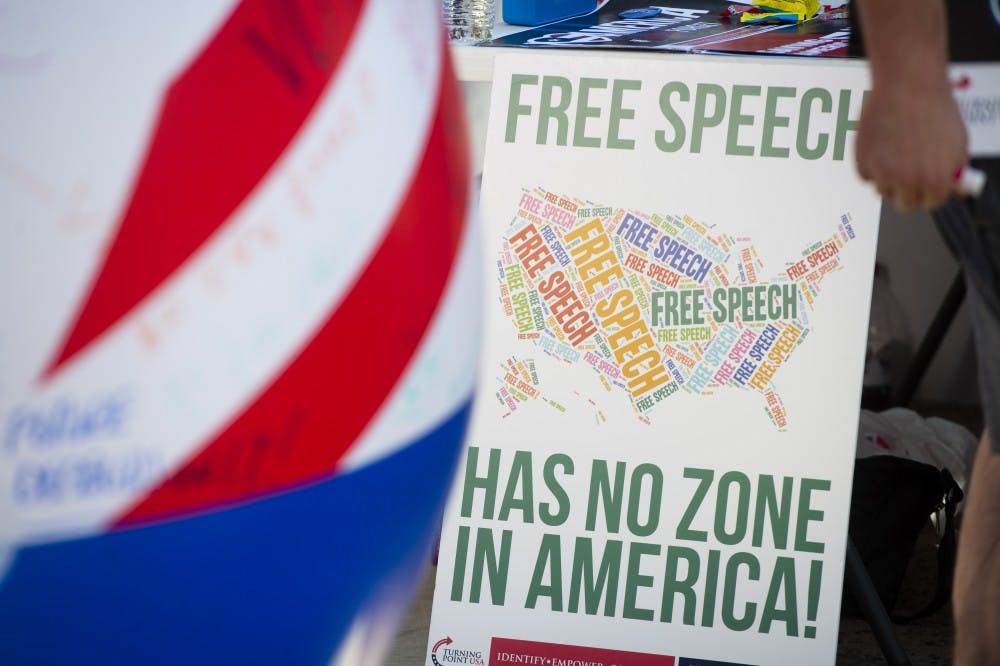Political clubs on campus have consistently utilized the constitutional concept of free speech to justify their actions — specifically their discriminatory ones.
However, the ASU community should see through the way these clubs attempt to justify their actions. They do not address the concern regarding their language, they simply hide behind their right to free speech. This ironically creates an atmosphere that censors opposing views.
Free speech was used to protect College Republicans United's recent Islamophobic speaker and was also used as a cover when their racist chats were leaked to the public last spring.
Democratic or left-leaning clubs can also utilize free speech to express their views, but most don't do it to incite hatred and discrimination toward oppressed groups.
READ MORE: Opinion: College Republicans United promotes Islamophobia
Other clubs on campus, such as Turning Point USA at ASU, revolve their mission around promoting the freedom of speech. This orient towards promoting free speech has made Turning Point the kind of organization that fits the category of hiding their discrimination behind the concept.
"On the one hand, I think what these student groups are trying to pick up on is a tradition of protest against a reigning orthodoxy or culture that relies on the value of freedom of speech to justify dissent," said Adam Seagrave, the associate director of the School of Civic and Economic Thought and Leadership.
Turning Point can often be seen as students walk to their next class near the MU — easily visible because of their giant inflatable free speech ball, which is plastered with the colors of the American flag and is a symbol of the First Amendment.
"I think that's an example of the way of using freedom of speech that’s absolute and isolated," Seagrave said. "And perhaps that is not recognizing the broader values and ecosystem within which free speech gets its meaning.”
Ironically, a club that represents free speech does a lot to repress opposing ideas on campus.
Turning Point has featured anti-communist U.S. Rep. Dan Crenshaw (R-Texas). Their entire political program is based on creating a red scare on college campuses. They frame leftist oppositions as a foolish endeavor in their videos, a few of which have been on the ASU Tempe campus.
These attempts at creating dialogue are nothing more than acts that seek to discredit and censor anti-capitalist ideas. In a sense, they want to shut up any opposition to right wing doctrines.
Turning Point even has a professor watch list that has led some to call the organization's practices a part of a new form of McCarthyism. This publication of professors is an example of attempting to repress leftist or opposing views.
On the topic of controversial speakers being brought to ASU by these political groups, Seagrave said they don't always represent the true value of freedom of speech, adding that, "a lot of times these speakers that are brought in may not be themselves oriented to caring about the value of truth or the value of knowledge."
He added that the speakers may not be "respecting the dignity of others, or certainly caring about other people.”
When groups that represent powerful interests frame the conversation around their constitutional rights, it allows them to dominate the conversation and to victimize themselves as the ones who are being oppressed — even though they are not.
"Raising the banner of free speech isn’t something that should be done by itself in an isolated way," Seagrave said. "It should be done in connection with the idea that we need to respect other people ... and with a sort of love not only as fellow human beings but as fellow citizens and members of our political community.”
Isolating the concept of free speech creates an aura of impunity for these clubs to discriminate freely, which includes the right to freely be racist, sexist and generally prejudice against people who are different from them.
Discriminatory and censoring ideas should not be normalized — they should be harshly and appropriately challenged. Especially as they seek to invoke censorship or discrimination against any kind of particular group.
Clarification: This article was updated on Oct. 24, 2019, at 7:41 p.m. to change its abstract to better reflect the columnist's views.
Reach the columnist at amisais@asu.edu or follow @comradealexia on Twitter.
Editor’s note: The opinions presented in this column are the author’s and do not imply any endorsement from The State Press or its editors.
Want to join the conversation? Send an email to opiniondesk.statepress@gmail.com. Keep letters under 500 words and be sure to include your university affiliation. Anonymity will not be granted.
Like The State Press on Facebook and follow @statepress on Twitter.




